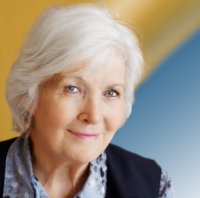By Diana B. Denholm, Ph.D., LMHC
 You didn’t expect to be a caregiver and you probably didn’t want to be one in the first place. You weren’t trained to be one, nor did you think you’d be doing it for so many years. As a caregiver, there are times when you just want to give up…when it’s so overwhelming that it looks like there’s no end and there are no answers. Well-meaning people tell you not to work so hard and to take care of yourself – and you’re pretty tired of hearing that. Don’t they understand you would if you could? Why don’t they just mind their own business!
You didn’t expect to be a caregiver and you probably didn’t want to be one in the first place. You weren’t trained to be one, nor did you think you’d be doing it for so many years. As a caregiver, there are times when you just want to give up…when it’s so overwhelming that it looks like there’s no end and there are no answers. Well-meaning people tell you not to work so hard and to take care of yourself – and you’re pretty tired of hearing that. Don’t they understand you would if you could? Why don’t they just mind their own business!
Meet caregiver Jean.
She has been married to Joe for thirty-six years. He developed Parkinson’s disease when they were in their early 40s, and they’ve been struggling ever since. They own a small printing business and worked side by side during the day, while sharing household duties at night. But now, Jean is the sole source of income and has total responsibility for the business – and the home – and for taking care of Joe. Now she is worn out and angry. Her doctor is concerned because she has lost too much weight and has high blood pressure.
Burnout comes from too much work and too many strong emotions.
The good news is that there are healthy and simple-to-learn ways to move through the challenges, pressures and frustrations life throws at you – decreasing your work load and making you more comfortable in the process. Here are some key strategies to reclaim your life and your relationships. Jean learned these because her life literally depended on it! Yours may too!
Understanding your worries and fears lifts a large burden.
Grief begins with the initial diagnosis and starts affecting caregivers immediately, both emotionally and physically. Understanding that simple fact helps you realize you’re not going crazy. Like you, Jean has many worries, fears, and strong emotions. She learned these are not only normal, but to be expected – and that you can do something about them. If you don’t, they’ll bleed into the care of your loved one, possibly damaging both of you. Emotions are neither good nor bad, they just are. And you’ve likely got a lot of strong ones now – with good reason. If you’re angry, don’t be mean or passive-aggressive. Release the anger through healthy talking, writing, and imagery. If you’re afraid, discuss that with your spouse, if appropriate. In confidence, share your strongest emotions with a close friend or support group so those emotions don’t eat you up and make you feel guilty.
Reclaiming your special connection with your loved one lightens your burden.
Not communicating effectively with the ill person makes caregivers carry more burdens.
Finally, she tried some new communication techniques that were immensely helpful. Whether it was mobility issues, their sex life, or what to do about family and friends, she now had a way to do it. First, she sorted out her concerns – deciding what she really needed to talk about with Joe. Then she learned how to approach him to set up a “talking date” and choose a setting that would assist their conversation. She prepared and calmed herself – and began the most important conversations of her life. Using learned communication tips and tools allowed her to speak to Joe in a way that was compassionate and effective. Now they were able to take the first steps to mutual agreement. By creating understandings and agreements, you as a caregiver can still have your life, and the two of you can still have your marriage.
Stay tuned for part 2 of this article shortly…..
– Guest Author, Diana B. Denholm, Ph.D., LMHC, author of “The Caregiving Wife’s Handbook – Caring for your Seriously Ill Husband, Caring for Yourself” (Hunter House 2012).
– Learn more tips and tools to reclaim the life and relationships you thought were lost. In my book, The Caregiving Wife’s Handbook, I offer strategies, tools, and resources for people caring for a spouse (or parent) navigate through a long-term serious illness. The Handbook is a wellspring of hope for relationships – and the life of the caregiver. It’s about making life work while your loved one’s health is falling apart.
